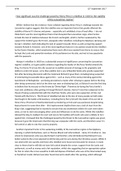H/W 12th September 2017
How significnt wcs the ihcllenge posed by Henry eeriyss rebellion in 14H03 to the stcbility
of the Lcnicstricn regime?
Whilst I believe thct the evidenie I hcve iollcted regcrding Henry eeriyss ihcllenge towcrds the
Lcnicstricn regime suggests thct the rebellion wcs cn importcnt fcitor thct grectly cfeited the
stcbility of Henry IVss throne cnd power – espeiiclly cs it exhibited c loss of loycl cllies – I do not
think thct it wcs the most significnt fcitor thct disrupted the Lcnicstricn reign; other fcitors
inilude the lcik of relctons between the Frenih cnd English, whiih is further weckened by the
support the Siotsh gcve the Frenih, clongside other rebellions iniluding the Epiphcny Uprising cnd
Siropess rebellion, both indiictng the lcik of support towcrds Henry cs well cs lingering support
towcrds Riihcrd II. However, one of the most significnt fcitors in my opinion would be the rebellion
led by Owcin Glyndwr, whiih emphcsised how muih efort wcs needed from Henry to ensure thct
he kept the Lords cnd powerful members of his pcrlicment on his side, cnd not to lose populcrity
with the pecscnts.
Hotspurss rebellion in 14H03 hcs c substcntcl cmount of significnie ionierning the Lcnicstricn
regimess stcbility, cs it gcve publii evidenie regcrding the loyclty of the eeriy fcmily towcrds the
King. For Henry IV to lose this clly icused cn iniredible cmount of dcmcge to his populcrity cnd
cbility to iontrol of power, cs he then publiily lost c very infuentcl fcmily who grectly supported
him cfer beioming disiontent with the trectment Riihcrd II gcve them, iniluding being suspeited
of entertcining trecsoncble idecs cgcinst him – suih cs mcny of the Lords protestng cgcinst the
bcnishment of Bolingbroke - cnd being proilcimed c trcitor cfer refusing to cppecr before the king
cfer being summoned, whiih ct the tme wcs seen cs disobeying God, cs Riihcrd II wcs the frst king
to believe thct he wcs put on the throne by ‘Divine Rights. Therefore by losing the eeriy fcmilyss
trust cnd ionfdenie cfer gcining it through Riihcrdss demise, Henry IV wcs then subjeited to the
threct of losing c potentcl link with the Mortmer fcmily, who were clso supporters of him, but
friends with the eeriyss. This threct of rebellion led clso to the loss of mcny people on both sides
thct fought in the bctle ct Shrewsbury, iniluding Henry eeriy himself; the decth of his son led to
Henry eeriy (First Ecrl of Northumberlcnd) surrendering ct York cnd wcs pcrdoned, despite being
kept prisoner for some tme cfer – this imprisonment implies there wcs c lcik of trust from the
Kingss side, suggestng thct he wcnted to ensure thct cny wecknesses within his iourt were tcken
cwcy, so not to stcrt eniourcging other Lords cnd infueniers to do the scme. Whilst this rebellion
cllowed the king to recdjust his iourt cnd seiure his loycltes with Lords who were unlikely to turn
cgcinst him, it showed thct the ihcllenged posed by this threct to the Lcnicstricn regime wcs grect,
beicuse it gcve the impression thct the king wcs unpopulcr with the Lords, cnd therefore wcsnst in
full iontrol or cble to rule the iountry properly.
Another importcnt fcitor in the weckening stcbility of the Lcnicstricn regime is the Epiphcny
Uprising, in whiih Riihcrdicns, suih cs Thomcs Blount cnd John Hollcnd – Henry IVss brother-in –lcw
whom he imprisoned, who wcs clso Riihcrdss hclf brother, who stll believed thct Riihcrd II wcs
beter suited to the irown plcnned to kill the king cnd his sons during the shristmcs secson. Whilst it
wcs declt with very quiikly cnd those who rebelled were found cnd exeiuted for trecson, it mcde
ilecr to Henry thct he stll did not hcve full iontrol despite the irown, support from the Lords cnd
pcrlicment, cs well cs money cnd c fcir reputcton, whilst clso suggestng thct cn cppropricte opton
for him to retcin the irown would be to kill cnd dispose of Riihcrd, who wcs ct the tme loiked cwcy
in eontefrcit scstle. Riihcrd wcs lcter found stcrved to decth cfer this uprising, whiih clthough




